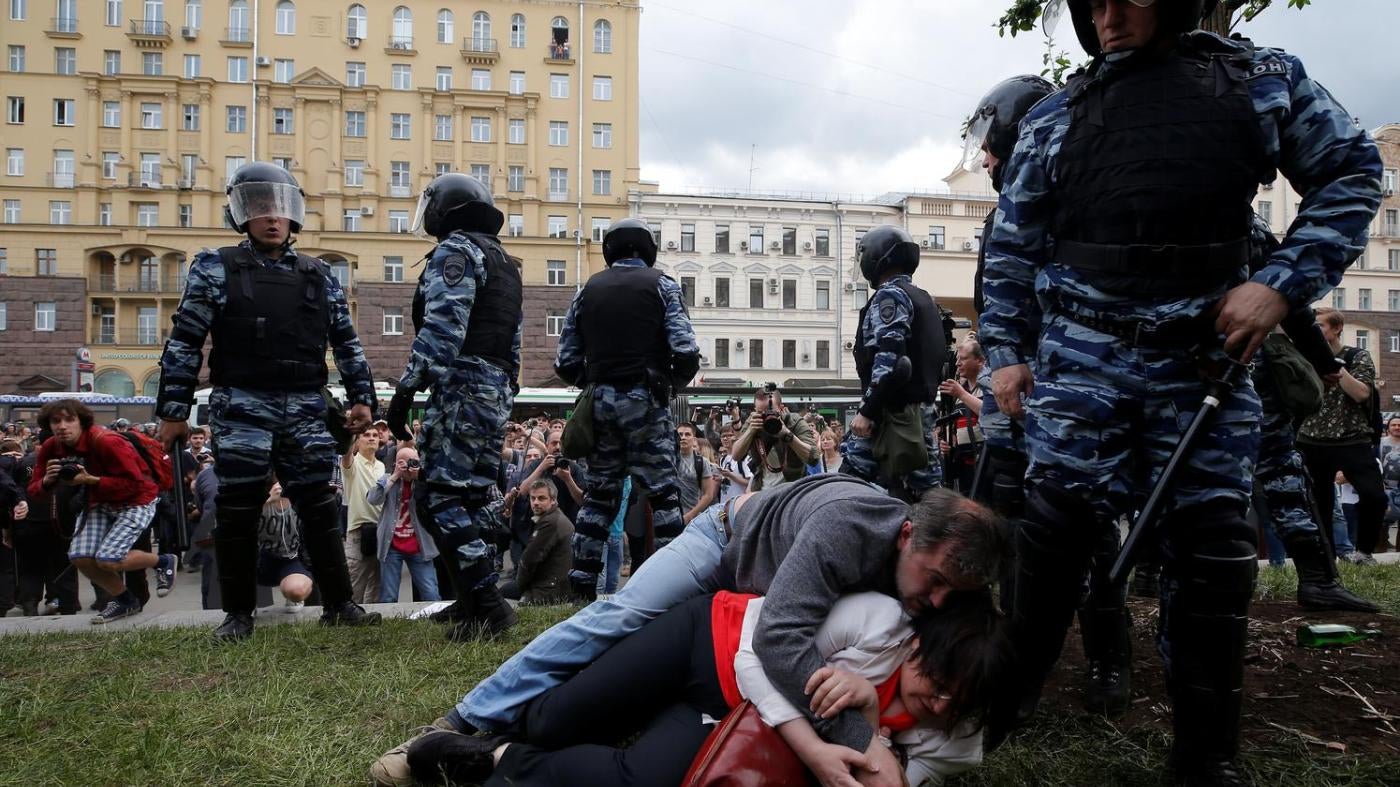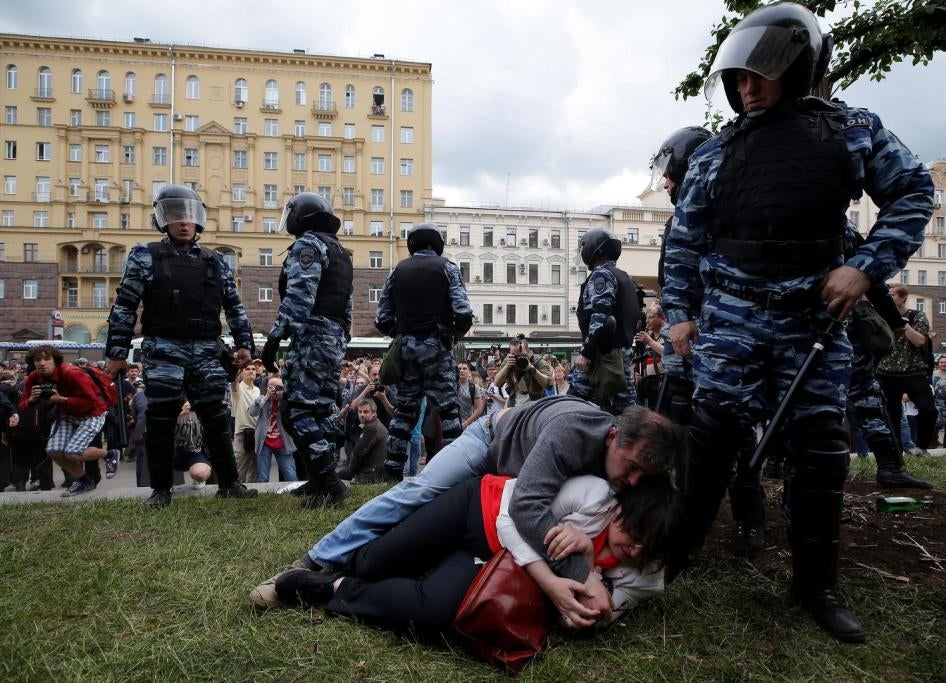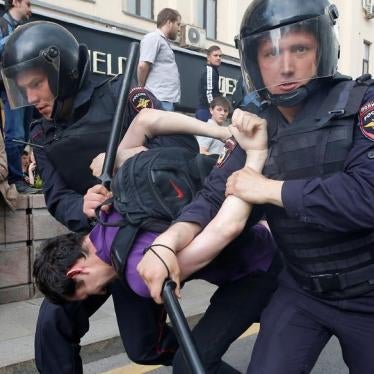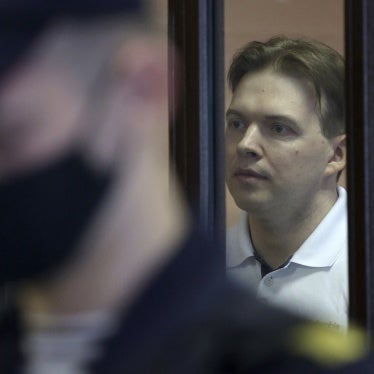When I spoke to Yulia Galyamina, she was in the hospital with a concussion and other injuries received after a riot police officer hit her in the face with a powerful blow. She still felt dizzy and achy, and several of her teeth were wobbly. As she recalled the events of that afternoon, Yulia, who is in her mid-40s, was often close to crying.
It happened on June 12th, Russia Day, a public holiday. The municipality organized entertainment in central Moscow, including on Tverskaya Street, the main thoroughfare. Then, a leading opposition politician, Alexei Navalny, called his supporters to gather there for an anti-corruption protest. The authorities refused to approve the rally and warned that its participants would be detained.
At the protest, the police presence was massive, Yulia said. The protesters mixed with the people who came for the entertainment. The protesters were peaceful, and many were singing songs, including Russia’s national anthem, waving Russian flags, holding hands, or dancing. Some wore T-shirts with political cartoons or chanted political slogans.
Yulia, who prominently campaiged against a major city renovation plan implemented in Moscow, and her husband Nikolai Tuzhilin went to the anti-corruption protest on Tverskaya Street, mainly because their two children, both university students, were also going. Yulia and Nikolai felt they had to be there, close to their kids.
There were about a thousand protesters by the Izvestia Publishing House building on Tverskaya, surrounded by riot police, Yulia said. Most of them just stood there, but in the middle of the crowd a group of 100 to 200 activists walked in a circle singing snippets of songs. The activists were young, “some were so young, they looked like children to me, no different from my children,” Yulia said. Then suddenly, riot police moved in, snatching people randomly from the crowd.
It was hard standing by and watching as riot police officers dragged off young protesters, some of them visibly frightened, Yulia said. She tried to intervene, asking officers to identify themselves, to show their badges, which were hidden were hidden by bullet-proof vests. She told them arbitrary detention of peaceful protesters was against the law. They didn’t listen. A group of protesters formed a chain, to make it more difficult for the riot police to pick them out one by one. Yulia was somewhere in the middle, and her husband held her from behind, to make sure the two of them wouldn’t get separated. And then one of the officers hit her in the jaw and she fainted from the blow. When Yulia came to several seconds later, she and her husband were on the ground surrounded by police. “I opened my eyes,” she recalled. “All I could see were their black boots around me.”
With all the commotion, Nikolai did not see the policeman deliver the blow – all he knows is that Yulia was hit with such force that he lost his balance.
A few minutes later, when the site was largely cleared of protesters, several police officers in black uniforms approached Nikolai and Yulia, who had gotten up from the ground, and told them to leave. Yulia, whose head felt like it was splitting from pain, still asked them to introduce themselves and to show their badges. One of them muttered, “So, that’s what you want?” – and called for reinforcement.
“My husband and I, we held on to each other but they dragged us apart,” Yulia said. Four officers picked her up by her arms and legs and carried her toward the police buses parked nearby. The buses formed a square with a closed off area inside, where police searched the detainees before forcing them to board the buses. When they finally put Yulia down and she got her bearings, she saw some police officers kicking Nikolai next to one of the buses, hitting him hard on his legs. She started yelling, “You don’t have the right!” – but they were already dragging Nikolai into the bus.
Yulia ran to the bus and tried to get in but the police wouldn’t let her. They told her to go away, but she wouldn’t give up, so several officials just carried her out of the enclosure formed by the buses. She was left on the ground, and she couldn’t stop crying – from the pain, dizziness, fear for her husband, and from the utter humiliation of it all.
Yulia spent a week in the hospital. Her clinical report cites a concussion, some soft tissue bruising to the head, bruising to the upper rib cage, and the traumatic dislocation of three teeth. Police released Nikolai after several hours at a Moscow police precinct, pending a court appearance for violating the public gatherings regulations.
As soon as she was discharged, Yulia filed a complaint with Russia’s chief investigative agency, detailing police abuse against her and her husband. What she, and her family, needs now is justice.



